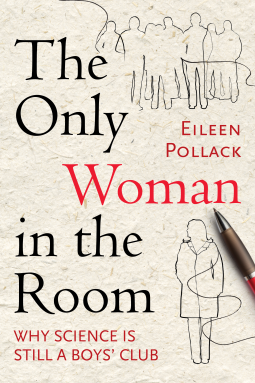
The Only Woman in the Room
Why Science Is Still a Boys' Club
by Eileen Pollack
This title was previously available on NetGalley and is now archived.
Send NetGalley books directly to your Kindle or Kindle app
1
To read on a Kindle or Kindle app, please add kindle@netgalley.com as an approved email address to receive files in your Amazon account. Click here for step-by-step instructions.
2
Also find your Kindle email address within your Amazon account, and enter it here.
Pub Date Sep 15 2015 | Archive Date Aug 05 2015
Description
In 2005, when Lawrence Summers, then president of Harvard, asked why so few women, even today, achieve tenured positions in the hard sciences, Eileen Pollack set out to find the answer. A successful fiction writer, Pollack had grown up in the 1960s and ’70s dreaming of a career as a theoretical astrophysicist. Denied the chance to take advanced courses in science and math, she nonetheless made her way to Yale. There, despite finding herself far behind the men in her classes, she went on to graduate summa cum laude, with honors, as one of the university’s first two women to earn a bachelor of science degree in physics. And yet, isolated, lacking in confidence, starved for encouragement, she abandoned her ambition to become a physicist.
Years later, spurred by the suggestion that innate differences in scientific and mathematical aptitude might account for the dearth of tenured female faculty at Summer’s institution, Pollack thought back on her own experiences and wondered what, if anything, had changed in the intervening decades.
Based on six years interviewing her former teachers and classmates, as well as dozens of other women who had dropped out before completing their degrees in science or found their careers less rewarding than they had hoped, The Only Woman in the Room is a bracingly honest, no-holds-barred examination of the social, interpersonal, and institutional barriers confronting women—and minorities—in the STEM fields. This frankly personal and informed book reflects on women’s experiences in a way that simple data can’t, documenting not only the more blatant bias of another era but all the subtle disincentives women in the sciences still face.
The Only Woman in the Room shows us the struggles women in the sciences have been hesitant to admit, and provides hope for changing attitudes and behaviors in ways that could bring far more women into fields in which even today they remain seriously underrepresented.
Named one of the notable nonfiction books of 2015 by The Washington Post
Advance Praise
“The
Only Woman in the Room is absolutely brilliant--even a sleeping pill
and head cold couldn’t stop me from reading it through the night.
Pollack’s story reveals so much - I want to give it to my children, my
husband, my older sister (a biologist), and every physicist I know, perhaps
with key passages underlined. And especially, young women in science: read this
book!"
--Meg Urry, President of the American Astronomical
Society, and former chair of the Department of Physics at Yale University
“In Eileen Pollack’s vivid
description of the issues facing women in science, I immediately saw the truth of what I have lived. Pollack is convincing in showing how the obstacles for
women in the U.S. are erected by our culture. In the 1960’s my mother had to
put up with exclusionary rules that kept her out of a career in science. You
would think things might have gotten better for my generation, and for the
current generation. But they have not. Eileen Pollack courageously and honestly
examines her own life and shows us why.”
--Carol Greider, winner of the
Nobel Prize in Physiology or Medicine and Daniel Nathans Professor and Chair of
the Department of Molecular Biology and Genetics at Johns Hopkins University
"With excruciating candor Eileen Pollack details how
society's relentless message that girls lack the intrinsic aptitude for
high-level math and physics leaves young women without the confidence to stay
the course in the brutally competitive environment of high-powered
science. This is a riveting, insider's-account of how unconscious biases make a mockery of meritocracy, why women's equality remains elusive, and why Larry Summers was so wrong."
--Nancy Hopkins, Amgen Inc. Professor of Biology (emerita), Massachusetts Institute of Technology
Marketing Plan
- Advertising in the Women's Review of Books and Chronicle Review
- Social media promotion using STEM-hashtags
- Online promotion targeting feminist, women in STEM communities
- LibraryThing and Goodreads giveaways (galley and finished copy)
- Academic promo to Gender Studies, Women's Studies, Education
- Events in NYC, Ann Arbor MI, Rochester NY, New Haven, Portland Ore
Available Editions
| EDITION | Other Format |
| ISBN | 9780807046579 |
| PRICE | $25.95 (USD) |
Links
Average rating from 16 members
Featured Reviews
 Janet P, Reviewer
Janet P, Reviewer
OK I admit it, I am a girl nerd and I've been one since I was about 8 or 10. I'm the exact same age as Pollack. I played with that same chemistry set. I had a microscope and I loved science along with many other things.
But where Pollack went and majored in physics at Yale, I went to an all-required liberal arts school. And perhaps that made a difference for being women in male-dominated fields.
Pollacks book begins with a memoir that takes her through college. As one of two women in her class to major in physics, she had plenty of hurdles to jump. And many of these hurdles still exist for women in the STEM areas.
For me the difference was vast. Everyone at my school (St. John's College) took four years of science and four of math. Our first lab experiment the first week of school was one where you could not succeed. We didn't get tested and we didn't look at our grades.
And what happened? Many women went into STEM fields. My classmates (there are about 30 women in my class) include at least 2 doctors, a math professor, several computer scientists, and a physics professor.
For me discrimination came at the end of graduate school and at times in my career.
But just as my experience is atypical and Pollack's more typical, both highlight difficulties women face in these male-dominated fields. Can they make it through? Will the environment kill the love they have for the subject? Can they still have a life?
Although we might hope these questions are less relevant now than they were in thew 70's and 80's, studies and anecdotal evidence, which Pollack weaves seamlessly into her book, say they still exist.
This is in spite of the help schools give to the girls, in spite of the support they get. Pollack does a graceful job of illuminating the problem, of showing evidence for it, and of showing different ways that are working to change this.
But at the end I'm left, as I think she is, wondering if this is enough, or what else needs to be done.
I loved this book, it's eye-opening. In fact this morning I found my husband telling the high school daughter of a friend not to be afraid of failure if she studies science, a lesson he learned through me, from the book..
Readers who liked this book also liked:
Marie Bostwick
Historical Fiction, Literary Fiction, Women's Fiction
Susan Mallery
General Fiction (Adult), Romance, Women's Fiction
Terah Shelton Harris
General Fiction (Adult), Multicultural Interest, Women's Fiction


















